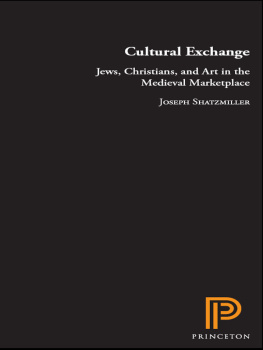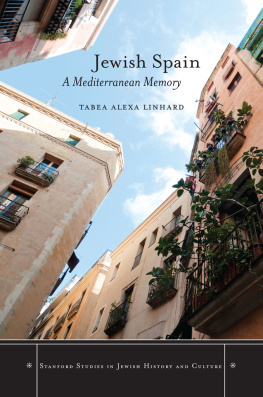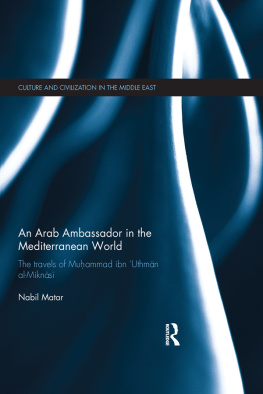About the Editor and Contributors
Mark R. Cohen , the Khedouri A. Zilkha Professor of Jewish Civilization in the Near East and Professor of Near Eastern Studies at Princeton University, is a well-known historian of the Jews in Arab lands in the Middle Ages. His books include Jewish Self-Government in Medieval Egypt , Al-mujtama al-yahudi fi Misr al-islamiyya fi al-usur al-wusta (Jewish Life in Medieval Egypt 6411382) , Under Crescent and Cross: The Jews in the Middle Ages , Poverty and Charity in the Jewish Community of Medieval Egypt , and The Voice of the Poor in the Middle Ages: An Anthology of Documents from the Cairo Geniza . Cohen has taught or given seminars at the Hebrew University of Jerusalem, Ain Shams University in Cairo, the Free University in Berlin, the Central European University in Budapest, the Ecole Practique des Hautes Etudes in Paris, and Columbia University. He has held a Guggenheim Fellowship, a Fellowship at the Wissenschaftskolleg in Berlin, a Fellowship from the National Endowment for the Humanities, and has been a Visiting Scholar at the National Humanities Center, where he also directed a DuPont Seminar for College Teachers on Islam. In 2010, he was the first winner of the Goldziher Prize for scholarship promoting better understanding between Jews and Muslims, awarded by Merrimack Colleges Center for the Study of JewishChristianMuslim Relations.
Olivia Remie Constable is professor of medieval history and the Robert M. Conway Director of the Medieval Institute at the University of Notre Dame. She received her BA in Near Eastern Languages and Literatures from Yale University in 1983, and her PhD in Near Eastern Studies from Princeton University in 1989. She then taught for six years at Columbia University, before moving to the University of Notre Dame in 1995. Her areas of research concern the economic, social, and cultural history of the medieval Iberian Peninsula and Mediterranean World, especially contacts between Muslims and Christians. She has published Trade and Traders in Muslim Spain: The Commercial Realignment of the Iberian Peninsula 9001500 (1994), which won the John Nicholas Brown Prize from the Medieval Academy of America; Medieval Iberia: Readings from Christian, Muslim, and Jewish Sources (1997; 2nd edition, 2011); and Housing the Stranger in the Mediterranean World: Lodging, Trade, and Travel in Late Antiquity and the Middle Ages (2003). She is currently working on a new book project titled Muslims in Medieval Europe , which looks at Muslim communities living under Christian rule in Spain and the western Mediterranean, from the eleventh to the fifteenth centuries. This project has received funding from the National Endowment for the Humanities and the American Council of Learned Societies. Remie Constable has been a member of the Institute for Advanced Study in Princeton, and was named a fellow of the Medieval Academy of America in 2009.
Ahmad Dallal is provost of the American University of Beirut (AUB) and professor of history in its Department of History and Archaeology. He joined AUB in the summer of 2009 from Georgetown University in Washington, D.C., where he served as the chair of the Department of Arabic and Islamic Studies. His previous teaching appointments were at Stanford University (20002003), Yale University (19942000), and Smith College (19901994). Dr. Dallals scholarship focuses on the history of science, Islamic revivalist thought, and Islamic law. His most recent publication, Islam, Science, and the Challenge of History , which traces the historical delineations between scientific knowledge and religious authority in Muslim societies, is based on the Dwight H. Terry lectures that he delivered at Yale University in February 2008. He received his BE (1980) from AUBs Department of Mechanical Engineering, and his PhD (1990) in Islamic Studies from the Department of Middle East Languages and Cultures at Columbia University in 1990.
Thomas F. Glick is professor of history at Boston University. A historian of science and technology, he specializes in medieval technology and modern science. As a medievalist, he has focused on the transfer of institutions, ideas, and techniques from the Islamic world into Europe through Spain, themes that run through his books, Irrigation and Society in Medieval Valenci a (1970; 2nd Spanish ed., 2003), Islamic and Christian Spain in the Early Middle Ages (2nd ed., 2005), From Muslim Fortress to Christian Castle: Social and Cultural Change in Medieval Spain (1995; Spanish ed., 2006), and Irrigation and Hydraulic Technology: Medieval Spain and its Legacy (1996). He wrote the chapter on science in Convivencia: Jews, Muslims, and Christians in Medieval Spain (1992), the catalogue of the influential exhibit of the same name at the Jewish Museum in New York. He has been a Guggenheim Fellow and twice a Fulbright Senior Lecturer at the University of the Republic, Montevideo. He was awarded an honorary doctorate by the University of Valencia in 2010.
Diana Lobel is associate professor of religion at Boston University. Her work focuses on comparative religious thought, including the intertwined traditions of Islamic and Jewish philosophy and the influence of Sufi mysticism on Jewish thought. She is author of The Quest for God and the Good: World Philosophy as a Living Experience (2011), A Sufi-Jewish Dialogue: Philosophy and Mysticism in Bahya Ibn Paqudas Duties of the Heart (2006), and Between Mysticism and Philosophy: Sufi Language of Religious Experience in Judah Ha-Levis Kuzari, (2000). Dr. Lobel received her BA in religion and philosophy from Oberlin College in 1979, her MTS from Harvard Divinity School in 1982, and her PhD in Near Eastern languages and civilizations from Harvard University in 1995. She was a Fellow at the Meyerhoff Center for Jewish Studies, University of Maryland at College Park from 1996 to 1997; held the Anna Smith Fine Chair in Judaic Studies at Rice University from 1997 to 1999; and was a Harry Starr Fellow in Judeo-Arabic Culture at Harvard Universitys Center for Jewish Studies from 1999 to 2000. She is currently working on a project on comparative conceptions of happiness and the flourishing life.
Kathryn A. Miller s research interests focus on medieval Iberia, Jewish ChristianMuslim relations in the medieval Mediterranean, commerce and legal history. She is the author of Guardians of Islam: Religious Authority and Muslim Communities of Late Medieval Spain . Millers current research is broadly concerned with how religious norms and institutions influence commercial exchanges and forms of cooperation between Christians and Muslims. She currently resides in Jordan, and is the recipient of a Fulbright Fellowship, an ACLS grant, and a NEH grant to work on one aspect of this research, a project titled Business with Infidels: Christian-Muslim Exchanges of Captives across the Mediterranean.
Joseph Montville is director of Toward the Abrahamic Family Reunion, (abrahamicfamilyreunion.org). He is also Distinguished Diplomat in Residence at American University and chairs the Center for World Religions, Diplomacy, and Conflict Resolution at George Mason University. He is also a senior associate in the Center for the Study of JewishChristianMuslim Relations at Merrimack College in North Andover, Massachusetts. Mont-ville spent twenty-three years as a diplomat with posts in the Middle East and North Africa, and he worked in the State Departments Bureaus of Near Eastern Affairs and Intelligence and Research, where he was chief of the Near East Division. Educated at Lehigh, Harvard, and Columbia Universities, Montville is also the editor of Conflict and Peacemaking in Multiethnic Societies and The Psychodynamics of International Relationships . He has had nonresident faculty appointments in political psychology in the Harvard and University of Virginia medical schools. In July 2008, The International Society of Political Psychology awarded him its Nevitt Sanford prize for distinguished professional contribution to political psychology.




